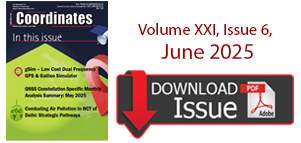| Galileo Update | |
Galileo Update
|
||||||||||
Astrium awarded Galileo Full Operational Capability Ground Control Segment Contract
Astrium has been selected by the European Space Agency and the European Union as prime contractor for the Galileo Full Operational Capability Ground Control Segment. The contract value is 73.5 million euros. The Ground Control Segment (GCS) contract covers the provision of GCS facilities for the operation of the constellation of Europe’s global navigation satellite system. The contract, which will be led by an Astrium team out of the UK, covers the provision of a new facility at Fucino (Italy) and the expansion of the existing Ground Control Centre at Oberpfaffenhofen (Germany). The deployment also includes the provision of a temporary GCS back-up facility at the Fucino Galileo Control Centre for the four In-Orbit Validation satellites, and the provision of two further Telemetry, Tracking and Command (TTC) stations on Reunion and Noumea. Astrium’s unique expertise in ground systems has enabled them to be selected for all phases of the Galileo GCS development and implementation. Astrium was responsible for the development, installation and test of the GCS for the Galileo demonstrator GIOVE-B, launched in April 2008 and which is still successfully operating in-orbit.
www.spacedaily.com
GIOVE missions serving as Galileo’s radiation watchdogs
Many experts forecast the space weather to be stormy. After years of inactivity, the Sun is waking up, perhaps profoundly affecting Earth’s space environment and the satellites orbiting through it – including the imminent Galileo constellation. Our parent star makes its presence felt in a variety of ways, from the solar radiation all life relies on to the steady stream of the solar wind, made up of ionised nuclei and electrons. Then there is the sudden eruption of billions of tonnes of highly energetic charged particles during solar storms – two of which occurred last month. It typically takes a couple of days for these solar streams to reach our vicinity, where their interactions with Earth’s magnetic field can cause spectacular low-latitude auroras, sometimes damaging electrical infrastructure. One 1989 event caused major power outages across Canada. The uppermost layers of the atmosphere making up the electrically charged ‘ionosphere’ are also perturbed. “The frequency of solar storms varies with the 11-year solar cycle, reflected by the amount of sunspots visible,” says Stefano Binda, an ESA engineer in the Galileo project. “Right now we are in the upwards phase, with maximum solar activity predicted between 2012 and 2014. “This is an issue of concern for all satellites and therefore also for Galileo, as we begin launching this October and are scheduled to begin operations by mid-2014, right in the heart of the ‘solar max’.”
http://www.spaceref.com/news/viewpr.html?pid=34169
Europe Finds LightSquared Harm to Galileo Signal
The head of the European Commission’s Directorate General for Enterprise and Industry, the agency that oversees all operations of the Galileo program, has filed an official comment on the Federal Communications Commission’s (FCC) docket regarding the Lightsquared proposal to broadcast a powerful terrestrial signal. Heinz Zourek addresses Julius Genachowski, FCC chair.
Analysis carried out in Europe, including by our own technical partner the European Space Agency, has shown that transmissions from LightSquared base-stations do indeed have considerable potential to cause harmful interference to Galileo receivers operating in the United States. Interference effects have been determined to occur in the range 100m to almost 1000km, depending on the type of receiver being used. This obviously presents a grave threat to the viability of providing a Galileo service covering US territory – a service which many studies have shown will not only benefit Galileo users, but those of GPS too as the two systems will be interoperable through a common signal design providing significantly improved coverage and accuracy in urban environments. The European Commission is also concerned about potential impacts to safety critical aviation applications. Europe is covered by the EGNOS system, which is equivalent and interoperable with the US WAAS, and so it is vital that EGNOS/WAAS receivers fitted to aircraft entering US airspace do not suffer degradation to the availability and reception of their navigation signals.
European Commission wants individual nations to fund GMES
The European Commission, in a surprise move, is proposing that its satellite-based Earth observation program be removed from its seven-year budget starting in 2014 and instead be funded by voluntary contributions from individual European governments. The decision to take the Global Monitoring for Environment and Security (GMES) effort off the commission’s books just as it begins operations drew immediate criticism from a group representing European geo-information companies. In a July 19 statement, the European Association of Remote Sensing Companies (EARSC) says the commission’s decision will leave GMES stillborn.
The European Union (EU), through the commission, has co-financed early GMES development with the 19-nation European Space Agency (ESA). The two organizations have invested some 2.3 billion euros ($3.2 billion) to date in developing the Sentinel series of GMES satellites, and in providing seed money for a GMES services sector. Up to now, it had been assumed that GMES and the Galileo satellite navigation project — the two so-called “flagship” European Union space programs — would secure long-term funding for the commission’s next budget cycle, which covers the period from 2014 through 2020. The European Parliament, the European Council, which includes ministers from European Union member states, and the commission itself have all endorsed GMES and Galileo in recent months.
Despite this, Galileo has found a home in the multiyear budget. The commission proposes a seven-year Galileo budget of 7 billion euros, a figure that includes completing the construction and launch of the first generation of satellites, operating the system and beginning work on a second-generation system. “A sufficient budget for its needs is proposed as part of this package,” the commission says, adding that Galileo will still need to work to reduce the expected cost overruns. For GMES, the commission cites a figure of 834 million euros per year that would be proposed, a la carte, to member states that would make individual decisions on whether to subscribe, and for how much. A similar mechanism is proposed for the ITER next-generation nuclear energy facility, whose budget, like that of Galileo, has far exceeded original estimates.
http://www.un-spider.org/about-us/news/en/5255/2011-07-22t114000/european-commission-wants-individual-nations-fund-gmes











 (No Ratings Yet)
(No Ratings Yet)






Leave your response!